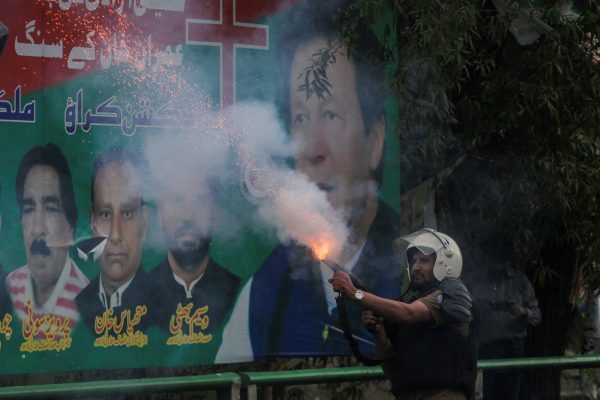Pakistan is simultaneously trying to cope with several economic and political crises. Pakistan’s dysfunctional political system and self-serving elites are largely to blame. Ousted former prime minister Imran Khan continues to battle the weak and disparate political coalition that replaced him in the courts and on the streets. Pakistan’s Supreme Court is also embroiled in a new controversy surrounding the Election Commission’s postponement of provincial elections in Punjab until October 2023.
The removal of Khan by a vote of no confidence in 2022 by Pakistan’s parliament and the subsequent violence and turmoil in the country created a political soap opera. Federal police botched an attempt to arrest Khan from his Lahore home for failing to appear for a hearing before the Election Commission. The Islamabad High Court deflated the tense situation somewhat by delaying the hearing until 30 March 2023. But the drama promises to continue as different cases in different locations will keep Khan on the backfoot.
During the political drama, Finance Minister Ishaq Dar failed to reach a timely agreement with the International Monetary Fund (IMF) on a review of the Pakistan economy that would lead to the release of the critical next tranche of aid worth around US$1 billion. This disbursement would have helped with the release of funding for the Pakistani government from other multilateral and bilateral sources.
Before releasing the aid, the IMF needed to confirm Dar’s prior promises that China and other countries were willing to play a role in Pakistan’s bailout. The IMF favours expenditure controls, better tax administration, and an end to subsidies and export tax rebates that favour larger firms and cartels.
The government announced fuel subsidies aimed to help the poor in March 2023 but they were complicated to implement and could add to the fiscal and energy deficits facing Pakistan. In February 2023, inflation rose above 30 per cent, touching 35 per cent in March, the highest level that it has been since 1974. Inflation has become a tax on the poor who spend more than half of their income on food. Taxes on imports have also led to a shutdown of the key industries that rely on imported inputs. As a consequence, import taxes have effectively become taxes on exports.
The Pakistani rupee has lost ground to the US dollar, fuelled in part by the surging demand for smuggling of dollars in neighbouring Afghanistan. Minister Dar — appointed for his relationship with the affluent political Sharif family — rather than for his knowledge of economics, predicted a strong rupee even before he returned to Pakistan from his perch in London.
Dar undercut former finance minister Miftah Ismail who appeared to be optimistic about an agreement with the IMF in June 2022. The IMF deal did not happen and Ismail was fired soon after Dar landed in Pakistan. Ismail did not extend the former governor of the State Bank of Pakistan Reza Baqir’s term in May 2022, which has left Dar as the economic czar.
Into this economic maelstrom came Khan’s political agitation aided by his powerful urban youth force.
Even within the military, younger officers and soldiers, largely recruited from Pakistan’s cities, are Khan supporters. The dissolution of Khan’s coalition government in Punjab province and of the majority government in the northwest province of Khyber Pakhtunkhwa added to national political uncertainty.
Khan demanded early national elections. He first accused the United States of conspiring to remove him but later absolved the United States of this charge and blamed the former chief of army staff and general Qamar Javed Bajwa. Bajwa in turn called Khan a ‘big liar’.
Prime Minister Shehbaz Sharif sought shelter behind the powerful new Chief of Army Staff General Syed Asim Munir, whom Khan had summarily removed from his position as director general of Inter-Services Intelligence. Sharif wants to delay elections until October 2023 to prepare the ground for his re-election.
But it is unclear if Sharif will be able to hold his shaky coalition together in the face of unrest on the streets and an economy with spiralling inflation.
Sharif’s finance minister, Dar, lost months to self-created economic turmoil as he blustered about the IMF and blinked in an expensive game of chicken. It seemed that Sharif was crafting a policy built on hope rather than the reality of financial inflows from other countries. Those inflows did not materialise until late March 2023.
Even if the government manages to keep the military on its side through March, April may well become the cruellest month for Pakistan if the IMF deal falls through and a government debt default occurs. In that case, the military may be tempted to take over or craft a fragile arrangement with Khan as a front man yet again. It is a Hobson’s choice for both the military and the people of Pakistan as economic danger rises.
Shuja Nawaz is a political and strategic analyst and Distinguished Fellow in the South Asia Center at the Atlantic Council.


Climate change was not the reason for devastating floods in Pakistan in 2022. It was the years of mismanagement of water resources that caused unprecedented floods in Pakistan. No reservoirs of any consequence have been built for the last 50 years or more. The last was Terbela inaugurated by Ayub Khan. And late Zulfikar Ali Bhutto inaugurated its extension. The timber mafia was given a free hand since the days of Ziaul Haq who bought off people by allowing a free hand in devastating the country. Excessive logging has resulted in soil erosion. Rivers and canals are not dredged during dry seasons because weak governments survive on doling out free bees. Cronyism and inability to set its house in order is why Pakistan is where it is – and Mr. Dar is the primary example of nepotism and corruption in the country.